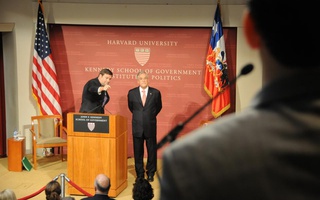Harvard signed an agreement with the government of Chile last week that would provide enough financial support to nearly double the number of Chilean students across the University’s graduate schools to a total of 50 students.
“When a bright student needs money, he or she should be able to come,” said Vice Provost for International Affairs Jorge I. Dominguez, who signed the agreement on behalf of the University.
The recently negotiated deal marks Harvard’s shifting strategy in securing sources of funding.
In recent months, University administrators have taken steps to ensure that terms of such agreements are flexible enough to accommodate its beneficiaries, whose needs will likely change over time.
Donations frequently come with strings attached. A fund, for instance, may be specifically intended to endow a professorship in Korean studies.
Harvard officials are now reevaluating whether restrictive agreements signed in the past can be renegotiated to match available resources with current needs.
“We now have a more systematic process, since there ought to be a mechanism to scrutinize endowments,” Dominguez said of the Gift Policy Committee, which is chaired by University Provost Steven E. Hyman and has now absorbed these responsibilities.
These efforts had been underway before the financial crisis heightened the need to allocate current use of funds efficiently, Dominguez said.
Over the last five years, Chile’s economy has been bolstered by a spike in copper prices. As copper accounts for roughly 16.4 percent of the nation’s GDP, according to the Central Bank of Chile, the government was able to accumulate a financial cushion of around $21 billion worth of savings in sovereign wealth funds and a similar amount in central bank reserves, the New York Times reported.
Such financial policies allowed Chile to announce a $4 billion stimulus package this January and provide fellowship funding to Chilean students at several foreign universities, including Harvard.
The new agreement will provide fellowships for about 30 additional students, as well as funding to support their families.
If a student’s spouse is admitted to Harvard, he or she would also receive a fellowship to cover educational expenses.
As Harvard students hail from over 120 countries, Dominguez said that the University is redoubling its efforts to obtain necessary funding to support international students. Currently, Harvard has entered into fellowship or scholarship agreements with 18 countries, including Chile.
“We want to make it possible for all to attend Harvard schools without financial constraints,” Dominguez said. “Obviously, there is a lot of work ahead.”
—Staff writer Athena Y. Jiang can be reached at ajiang@fas.harvard.edu. —Staff writer June Q. Wu can be reached at junewu@fas.harvard.edu.
Read more in News
Swine Flu Research Takes HoldRecommended Articles
-
POSTCARD: Disconnecting the DotsI sat awkwardly, trying to think of an answer to a question I had now been asked one too many times: “How are you going to integrate your summer experience into your life at Harvard and beyond?”
-
The Miners and the PresidentOct. 13, 2010 was a joyous day for the 33 miners who were finally rescued from a collapsed mine shaft in northern Chile and reunited with their families.
-
Not Always a Land of PlentyEspecially as she makes her journey through Chile, our university’s president will hopefully see both the nation’s progress and continuing struggles and bring back a renewed desire to continue the University’s outreach and build partnerships to promote a more equitable future.
-
Faust Visits Chile, BrazilThis week University president Drew G. Faust will explore Harvard’s involvement in Latin America though a week of travel in Chile and Brazil.
-
Harvard Introduces Chilean FellowshipHarvard University will create a new fellowship for students in Chile to pursue graduate degrees at Harvard.
-
 At IOP, Chilean President Defends Response to Protests
At IOP, Chilean President Defends Response to Protests













